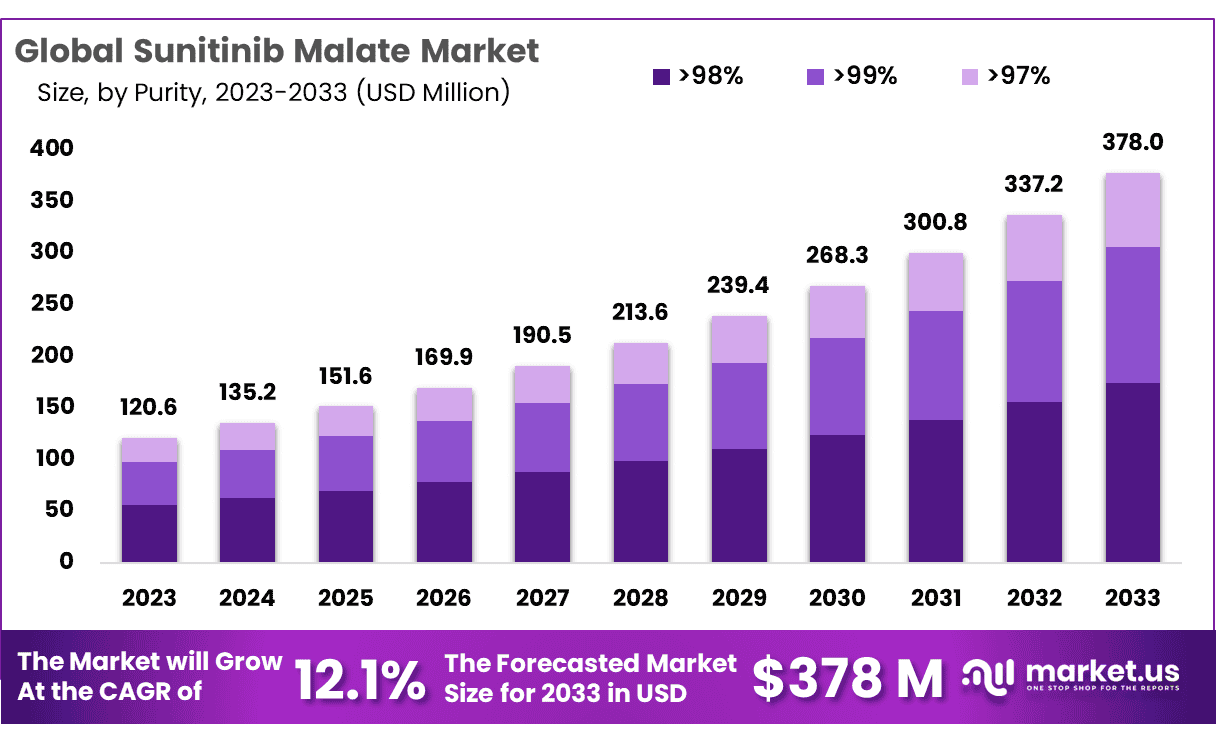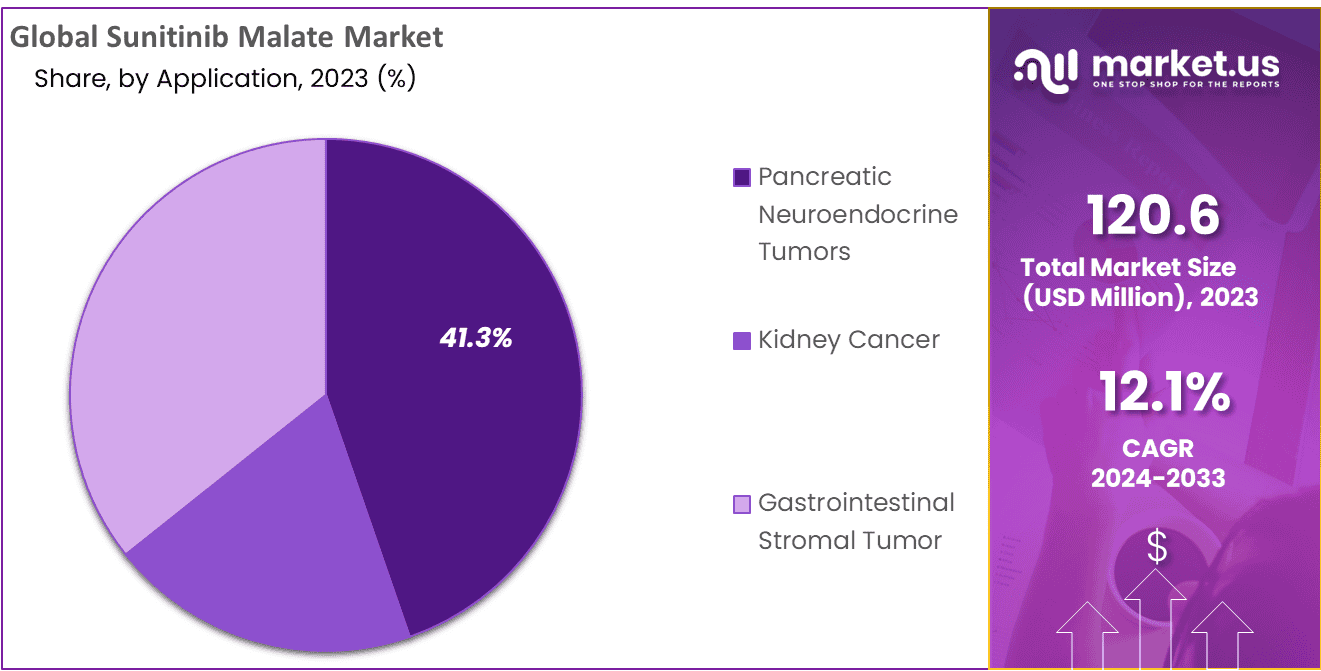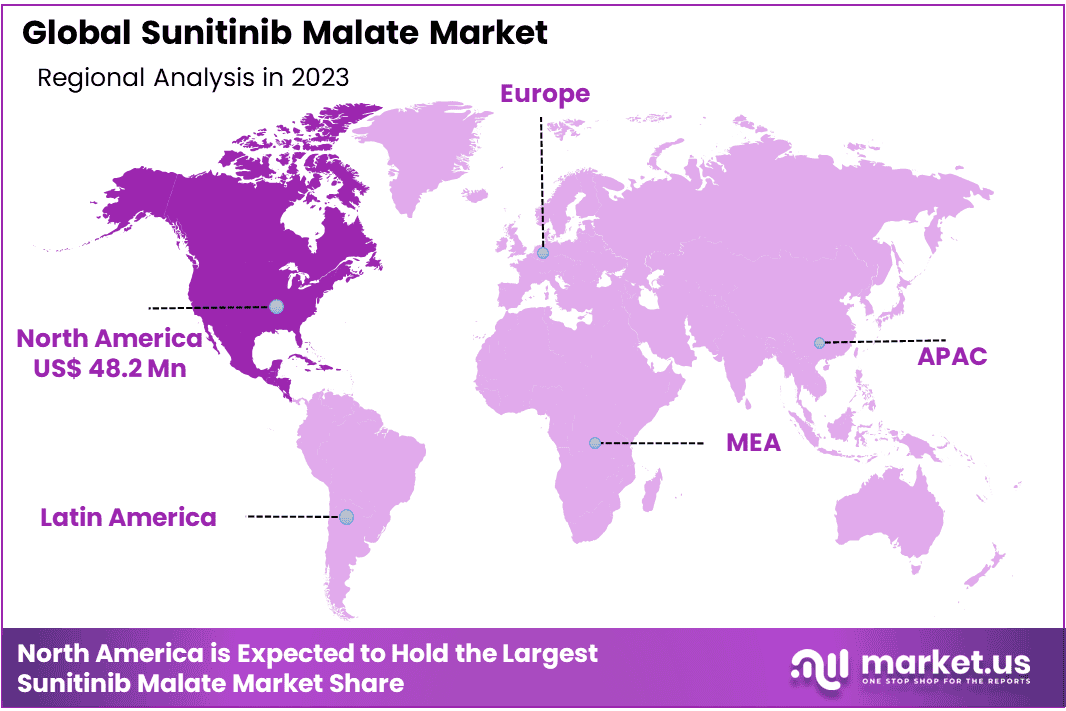Global Sunitinib Malate Market By Purity (>99%, >98%, >97%) By Application-(Pancreatic Neuroendocrine Tumors, Kidney Cancer, Gastrointestinal Stromal Tumor) and by Region and Companies - Industry Segment Outlook, Market Assessment, Competition Scenario, Trends and Forecast 2024-2033
- Published date: Dec 2023
- Report ID: 84959
- Number of Pages: 348
- Format:
-
keyboard_arrow_up
Quick Navigation
Market Overview
The Global Sunitinib Malate Market size is expected to be worth around USD 378.0 Million by 2033 from USD 120.6 Million in 2023, growing at a CAGR of 12.1% during the forecast period from 2024 to 2033.
Sunitinib malate is an oral capsule medication proven to successfully inhibit various receptor tyrosine kinases (RTKs). With proven antineoplastic activity and significant potential antineoplastic properties, its antineoplastic activity makes Sunitinib malate an indispensable agent against cell proliferation and angiogenesis. Sunitinib capsules have received approval as treatment for pancreatic neuroendocrine tumors, kidney cancer.
Sunitinib is used to treat gastrointestinal stromal tumors (GIST; a type of tumor that grows in the stomach, intestine (bowel), or esophagus (the tube that connects the throat with the stomach) in people with tumors that have not been treated successfully with imatinib (Gleevec) or people who cannot take imatinib. Sunitinib Malate is a drug that helps keep cancer cells from growing by blocking specific proteins. Sunitinib Malate is an orally administered drug approved by the FDA (Food and Drug Administration). It is sold under the brand name Student.
The biggest market for the drug sunitinib malate is the US, followed by Germany and Japan. In 2020, The market in the US was valued at US$ 19.7 Million. This is mostly attributed to the higher frequency of pancreatic cancer. The increasing adoption of sunitinib malate to treat Primitive Neuro-Ectodermal Tumors (pNET) is another reason for the further growth of this market in the US.
Sunitinib malate has been found to cause many side effects, such as fatigue, hypertension, etc. There are certain eligibility criteria for patients to receive the administration of this drug, with the general administration or treatment timeline being four weeks, which is then followed by two weeks of abstinence.

*Actual Numbers Might Vary In The Final Report
Key Takeaways
- Market Size: Sunitinib Malate Market size is expected to be worth around USD 378.0 Million by 2033 from USD 120.6 Million in 2023.
- Market Growth: The market growing at a CAGR of 12.1% during the forecast period from 2024 to 2033.
- Purity Analysis: purity level that exceeds 98% and an incredible 46.1% market share.
- Application Analysis: Pancreatic Neuroendocrine Tumors occupy 41.3% of market share in 2023.
- Regional Analysis: North America, accounting a substantial 40% share and USD 48.2 Million of the market revenue.
- Precision Medicine Trend: Sunitinib Malate fits within the trend toward personalized and targeted therapies, highlighting its significance in an age of precision medicine.
- Strategic Collaborations and Partnerships: The market has recently witnessed an increasing trend of strategic collaborations and partnerships, which foster innovation by helping to develop novel formulations and combination therapies.
Purity Analysis
Sunitinib Malate perform an outstanding presence in the market, its dominance reflected by an exceptional purity level that exceeds 98% and an incredible 46.1% market share attesting to its superior quality and efficacy. Sunitinib Malate has been extensively researched as an inhibitor of multiple receptor tyrosine kinases (RTKs), showing its capability in impeding cell proliferation and angiogenesis.
Sunitinib Malate’s market success can be attributed to its wide array of approved applications for treating pancreatic neuroendocrine tumors, kidney cancer and gastrointestinal stromal tumor (GIST). Furthermore, its purity level of over 98% not only demonstrates pharmaceutical industry commitment to quality but also cements Sunitinib Malate as an oncological therapeutic and further cementing its dominance on the pharmaceutical landscape.
Application Analysis
By application, Sunitinib Malate has earned itself an established place in the pharmaceutical market, due to its diverse applications. Pancreatic Neuroendocrine Tumors occupy 41.3% of market share; Sunitinib Malate’s successful treatment of these tumors demonstrates its power in managing complex medical conditions.
Sunitinib Malate has demonstrated its effectiveness in the treatment of kidney cancer, expanding its market presence further. Furthermore, its ability to target multiple receptor tyrosine kinases (RTKs) makes it an attractive therapeutic option against kidney cancer, further strengthening its position within the market.
Sunitinib Malate has also earned considerable renown for its application in treating Gastrointestinal Stromal Tumor (GIST), expanding its reach across diverse oncological domains. A testament to its multi-functional utility, Sunitinib Malate stands as an outstanding oncological therapeutic, dominating across different segments of the pharmaceutical market.

*Actual Numbers Might Vary In The Final Report
Key Market Segments
Purity
- >99%
- >98%
- >97%
Application
- Pancreatic Neuroendocrine Tumors
- Kidney Cancer
- Gastrointestinal Stromal Tumor
Driver
Targeted Cancer Incidence Increase
Sunitinib Malate market growth is being propelled by the rising incidence of pancreatic neuroendocrine tumors, kidney cancer and gastrointestinal stromal tumors (GIST). Sunitinib Malate has proven its efficacy at inhibiting multiple receptor tyrosine kinases associated with these cancers – contributing to its increasing worldwide prevalence and driving its demand as an effective therapeutic option – which in turn drives market expansion.
Advancements in Research and Development
Ongoing research and development efforts in oncology help expand the Sunitinib Malate market. Innovation of novel applications, formulations and combination therapies using Sunitinib Malate are fueling its market expansion; as is an evolving understanding of cancer molecular pathways resulting in new indications being discovered for Sunitinib Malate; offering opportunities for expansion and diversification of this therapy market.
Trend
Targeted Therapies and Personalized Medicine
Sunitinib Malate market trends indicate a shift toward personalized medicine and targeted therapies. Sunitinib Malate’s ability to selectively target molecular pathways associated with cancer makes it a prominent player in precision medicine era, where treatments are tailored based on genetic profiles or disease characteristics of individual patients, driving its adoption in oncological care settings.
Strategic Collaborations and Partnerships
Sunitinib Malate-based treatments are currently witnessing an upsurge in strategic collaborations and partnerships among pharmaceutical companies, research institutions and healthcare providers. These partnerships seek to leverage combined expertise for developing innovative formulations, combination therapies and expanded indications using Sunitinib Malate. Alliances such as these foster an ever-evolving market landscape while creating dynamically competitive conditions in which Sunitinib Malate treatments may emerge and advance over time.
Restraint
Adverse Effects and Tolerability Issues in Restraint Therapy
Sunitinib Malate can be effective, yet still cause adverse side effects like fatigue, gastrointestinal disturbances and hematologic abnormalities. Tolerability issues pose an impediment to its widespread adoption. Addressing these concerns and developing strategies to manage and mitigate adverse reactions is integral in order to overcome this barrier.
Sunitinib Malate Treatment Is Expensive
Unfortunately, the cost of Sunitinib Malate remains a major barrier to its use among certain patient populations, making the medication unavailable or unaffordable in areas with limited healthcare resources. Therefore, efforts towards making Sunitinib Malate more cost-effective or exploring reimbursement strategies become crucial components in combatting this barrier.
Opportunity
Expand into Emerging Markets
An opportunity lies in expanding Sunitinib Malate into emerging markets where cancer burden is growing rapidly, where healthcare infrastructure and awareness is increasing, as these regions present untapped potential that market players can exploit by introducing Sunitinib Malate to meet unmet medical needs.
Pipeline Development and Identification of New Indications
Sunitinib Malate presents an immense opportunity for development as its use expands with ongoing clinical trials and new indications are identified and granted regulatory approvals, creating new therapeutic areas and expanding market potential. Novel formulations or combination therapies further increase this drug’s appeal across clinical settings.
Regional Analysis
As of 2023, the sunitinib malate market is primarily dominated by North America, accounting a substantial 40% share and USD 48.2 Million of the market revenue. The driving force behind the notable growth of sunitinib malate in this region can be attributed to the escalating incidence of pancreatic cancer. Additionally, the United States, within North America, experiences a considerable boost in market dynamics due to the combination of high customer incomes and extensive health insurance coverage for life-threatening illnesses. This heightened financial accessibility contributes to the increased affordability of cancer treatments, fostering further growth within the market.
Moreover, the market in North America benefits from recent initiatives by the US Food and Drug Administration (USFDA) aimed at catalyzing advancements in the cancer drug sector. The USFDA’s strategic move involves expediting clinical development by granting pre-market approval to pharmaceuticals in the clinical phase. This proactive regulatory approach serves to accelerate progress in the field, fostering innovation and reinforcing the overall expansion of the sunitinib malate market in North America.

*Actual Numbers Might Vary In The Final Report
Key Regions and Countries
North America
- The US
- Canada
- Mexico
Western Europe
- Germany
- France
- The UK
- Spain
- Italy
- Portugal
- Ireland
- Austria
- Switzerland
- Benelux
- Nordic
- Rest of Western Europe
Eastern Europe
- Russia
- Poland
- The Czech Republic
- Greece
- Rest of Eastern Europe
APAC
- China
- Japan
- South Korea
- India
- Australia & New Zealand
- Indonesia
- Malaysia
- Philippines
- Singapore
- Thailand
- Vietnam
- Rest of APAC
Latin America
- Brazil
- Colombia
- Chile
- Argentina
- Costa Rica
- Rest of Latin America
Middle East & Africa
- Algeria
- Egypt
- Israel
- Kuwait
- Nigeria
- Saudi Arabia
- South Africa
- Turkey
- United Arab Emirates
- Rest of MEA
Key Players Analysis
The global sunitinib malate market exhibits a moderate level of competition, featuring both local and global companies. Major industry players are actively engaging in various growth strategies, including product launches, acquisitions, and collaborations, to foster the expansion of the sunitinib malate market on a global scale. These strategic initiatives play a pivotal role in driving the overall growth and competitiveness of the market. Notable key players contributing significantly to the market’s expansion include:
Market Key Players
- Pfizer
- Brawn Laboratories Ltd INDIA
- Topcare pharmaceutical Co. Ltd
- Hetero Drugs Ltd INDIA
- Reliance Life Sciences Pvt. Ltd
- Target Molecule Corp.
- J&K Scientific
- Nanjing First Pharmaceutical Co. Ltd.
- Biotechnica Pharma Global
Recent Developments
- Pfizer: Pfizer partnered with Alnylam Pharmaceuticals to develop and commercialize RNAi therapeutics for kidney cancer, potentially impacting the future dynamics of the Sunitinib Malate market.
- Brawn Laboratories Ltd INDIA: Expanding production capacity and distribution network to increase market share in India and other emerging markets.
- Topcare pharmaceutical Co. Ltd: Received approval for a new sustained-release formulation of Sunitinib Malate in China, offering an improved patient experience.
- Hetero Drugs Ltd INDIA: Received WHO prequalification for its Sunitinib Malate, opening doors to supplying the drug through UN agencies.
- Reliance Life Sciences Pvt. Ltd: Partnered with a leading cancer institute in India to conduct clinical trials on new drug combinations involving Sunitinib Malate.
Report Scope
Report Features Description Market Value (2023) USD 120.6 Million Forecast Revenue (2033) USD 378.0 Million CAGR (2024-2033) 12.1% Base Year for Estimation 2023 Historic Period 2018-2022 Forecast Period 2024-2033 Report Coverage Revenue Forecast, Market Dynamics, Competitive Landscape, Recent Developments Segments Covered By Purity-(>99%, >98%, >97%); By Application-(Pancreatic Neuroendocrine Tumors, Kidney Cancer, Gastrointestinal Stromal Tumor) Regional Analysis North America-US, Canada, Mexico;Europe-Germany, UK, France, Italy, Russia, Spain, Rest of Europe;APAC-China, Japan, South Korea, India, Rest of Asia-Pacific;South America-Brazil, Argentina, Rest of South America;MEA-GCC, South Africa, Israel, Rest of MEA Competitive Landscape Pfizer, Brawn Laboratories Ltd INDIA, Topcare pharmaceutical Co. Ltd, Hetero Drugs Ltd INDIA, Reliance Life Sciences Pvt. Ltd, Target Molecule Corp., J&K Scientific, Nanjing First Pharmaceutical Co. Ltd., Biotechnica Pharma Global Customization Scope Customization for segments, region/country-level will be provided. Moreover, additional customization can be done based on the requirements. Purchase Options We have three licenses to opt for: Single User License, Multi-User License (Up to 5 Users), Corporate Use License (Unlimited User and Printable PDF) Frequently Asked Questions (FAQ)
What is Sunitinib Malate?Sunitinib Malate is a small-molecule medicine known for its effectiveness in inhibiting multiple receptor tyrosine kinases (RTKs), making it a valuable therapeutic option in cancer treatment.
How big is the Sunitinib Malate Market?The global Sunitinib Malate Market size was estimated at USD 120.6 Million in 2023 and is expected to reach USD 378.0 Million in 2033.
What is the Sunitinib Malate Market growth?The global Sunitinib Malate Market is expected to grow at a compound annual growth rate of 12.1%. From 2024 To 2033
Who are the key companies/players in the Sunitinib Malate Market?Some of the key players in the Sunitinib Malate Markets are Pfizer, Brawn Laboratories Ltd INDIA, Topcare pharmaceutical Co. Ltd, Hetero Drugs Ltd INDIA, Reliance Life Sciences Pvt. Ltd, Target Molecule Corp., J&K Scientific, Nanjing First Pharmaceutical Co. Ltd., Biotechnica Pharma Global.
How is the Market Characterized in Terms of Competition?The Sunitinib Malate market is moderately competitive, featuring both local and global companies. Major players are adopting growth strategies like product launches, acquisitions, and collaborations.
What Trend is Notable in Sunitinib Malate Treatment?There is a trend towards personalized medicine and targeted therapies, aligning with Sunitinib Malate's ability to selectively target specific molecular pathways associated with cancer.

-
-
- Pfizer
- Brawn Laboratories Ltd INDIA
- Topcare pharmaceutical Co. Ltd
- Hetero Drugs Ltd INDIA
- Reliance Life Sciences Pvt. Ltd
- Target Molecule Corp.
- J&K Scientific
- Nanjing First Pharmaceutical Co. Ltd.
- Biotechnica Pharma Global










